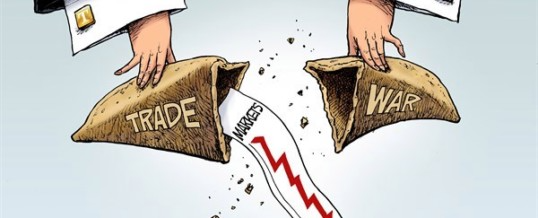

The U.S. political landscape is shifting dramatically, and no one knows what this shake out will uncover. For better or worse, it is certainly rocking the boat for U.S. residents, but changes are afoot for other global entities as well.
One of these entities is China.
According to media reports as recent as yesterday, China says it is “fully prepared” for a trade war with the U.S.
This coming Friday is when the U. S. is scheduled to begin charging tariffs on £34bn (£26bn) of Chinese goods. This new U.S. 25% tariff will be slapped on a whopping 818 Chinese products, with the potential for another 284 items to be added, reports The Independent.
Unsurprisingly, affected countries, like China, has pledged retaliatory tariff sanctions that in return it will do the same to 545 American products. Articles however have suggested that China initially offered to purchase nearly $70 billion in energy, agriculture and manufacturing products if Trump suspended the tariffs on its U.S. exports.
At the time of writing, we’ve seen no evidence of a deal, so affected industries from manufacturing to farming to information technology are stealing themselves for the tariff punch.
Back in April, Trump listed some of the Chinese imports deemed by the president to make advantage of unfair trade practices. According to Politico:
“…a recent U.S. Trade Representative report that shined a light, in part, on accusations that China was conducting cyber theft of U.S. intellectual property. “We … have the theft of intellectual property, and that probably is in the neighborhood of $200 [billion] to $300 billion a year,” President Donald Trump said Tuesday.”
Sectors included products used for robotics, computing, communication technology and aerospace — “which some economists note are areas that would benefit from China’s industrial upgrading plans,” reported CNBC at the time.
Some are indeed pointing to a silver lining. For instance, arguments like China has more to lose in the tech sector than the U.S. because U.S. tech firms are being strongly encouraged to return their manufacturing business to home soil, which in turn may stimulate job growth.
Apple, for example, were out of the gates ahead of the pack, committing to U.S. investment – to the tune of 20,000 jobs and $350 Billion in U.S. economic contributions – back in January. And Cisco was quick to calm fears, saying in April the company was not concerned about a trade war between the U.S. and southeast Asian countries, “notably China.”
While countries around the world shuffle their tariff rates to secure the best deals possible, tensions from the ground up in the technology sector are high. Financiers are shying away from investing and experts are warning of unprecedented nation-state cyber attacks. Add to this the new privacy regulations, such as California’s new Privacy bill and GDPR, both of which require companies manage their data with much more care and finesse.
If you want U.S.-based expert cyber risk advice, be it to comply with regulators, to run risk assessments, vulnerability scans and penetration tests, or to secure a CISO-on-Demand to guide you through the info technology mind field on an as-required basis, we are here to help. Contact us.